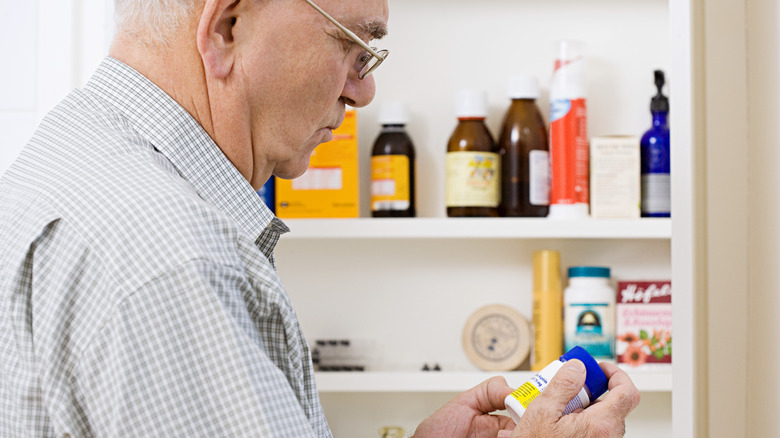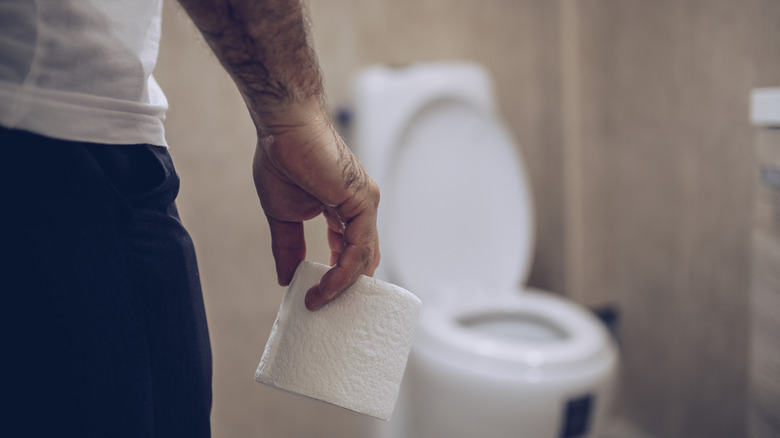The Common Medication You Should Avoid Taking At All Costs If You Have An Enlarged Prostate
There are a number of outside factors that people diagnosed with an enlarged prostate will want to keep in mind when trying to keep lower urinary tract symptoms (LUTS) at a minimum. Also known as benign prostatic hyperplasia (BPH), most older men are affected by an enlarged prostate as the gland continues to grow larger later in life. In addition to dietary choices, stress, and how much time one spends exercising, the medications a person uses can also influence symptoms, according to experts at Penn Medicine. You might not think twice about this common, everyday medicine, but decongestants made with pseudoephedrine are one such drug that can aggravate an enlarged prostate.
These drugs may be a lifesaver when it comes to alleviating clogged nasal passages, but as vasopressor adrenergics (e.g., Sudafed), they cause the muscles of the prostate and bladder neck to constrict, explains Healthline. This makes emptying the bladder difficult, a symptom that people with BPH often already struggle with.
How pseudoephedrine-containing decongestants can affect urination
Even people without an enlarged prostate may find that they experience voiding dysfunction as a side effect of pseudoephedrine use. Published in 2015, research pulled from "Evidence-Based Physical Therapy for the Pelvic Floor (Second Edition)" outlines how voiding dysfunction pertains to difficulty relaxing the muscles of the bladder neck, urinary sphincter, or pelvic floor when peeing (via ScienceDirect).
In a 2016 study published in Drug Design, Development and Therapy, researchers examined how pseudoephedrine affected the urinary health of more than 100 males experiencing nasal congestion. None of the men had preexisting urinary issues. The findings showed that patients over the age of 50 were over 50% more likely to experience urinary retention or dysuria (pain while peeing) in connection with pseudoephedrine usage. The study team concluded that special precautions need to be taken in regards to pseudoephedrine treatment for cold and flu symptoms in older males. Knowing that these side effects can impact individuals without BPH, those with the condition may feel these effects compounded.
People with an enlarged prostate are encouraged to take these congestion medications instead
These same risks exist for decongestants that also contain antihistamines, according to experts at the Urological Research Foundation. These medications trigger the opposite reaction of decongestants and stop the bladder muscles from constricting, thereby making voiding challenging (via Healthline). But this doesn't mean that people with an enlarged prostate are doomed to suffer at the first sign of a stuffy nose. Rather, they'll want to look into alternate symptom-relief medications. While Benadryl, Dimetapp, and Nytol are antihistamines that have been linked with an increased risk for bladder muscle contractions, Claritin, Zyrtec, and Allegra are safer bets. For decongestants, the Midwest Institute for Non-Surgical Therapy suggests reaching for products like Mucinex DM. Decongestants made with dextromethorphan or guaifenesin (which helps break up mucus) are not known to exacerbate BPH symptoms.
If you are diagnosed with an enlarged prostate, consult with your doctor or pharmacist about which medications may be advised against in order to prevent any worsening of symptoms.



